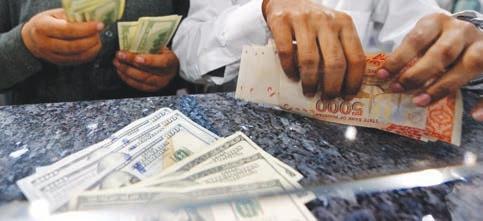
8 minute read
Default and future prospects
Pakistani default will mean terrorists on the rise age and never flunk in the 21st Century. If Pakistan flunks, the jihadist and terrorist factions will be empowered to intrude in the domestic setup of the country. This will cause social discontent and social anarchy in Pakistan. If these social anomalies exist in Pakistan they will not stop here. The will spread like a contingent pandemic across the globe.

Advertisement
The heaps of garbage in the empty plots in Barakahu bear testimony to the inefficiency and indifference of administrative authorities to solid waste management.The natural water springs that flow from Margalla hills and pass through the areas of Malpur, Barakahu and Bani Gala have becomes a pollution hub and have turned into stinky drains because they have become dumping grounds for domestic waste. According to WASA, if a 250-ml polythene bag was dipped into the lake one could find 500 coliform bacteria per millilitre in it (coliform: a bacteria found in human faeces, causing hepatitis). Despite various proposals to find alternatives and to clean these streams by building filtration plants, nothing has been implemented and no action taken by the authorities to address and resolve these issues permanently.
Keeping in view the socio-political aspects of Barakahu, the following policy recommendations are being made. The strategy is divided into three phases including surveys of the local residents to get an understanding of the overall awareness level and the consent of the citizens. This will also help indicate the root causes of the issue at primary and secondary level. The second phase would be to increase awareness of the message. The final phase will include implementation of solid waste management and recycling of international standard.
Initially a KAP (Knowledge, Attitude, Practices) survey should be conducted and followed with indepth interviews to get detailed information about the issue from the residents which will help to point out the root causes of the issue at both primary and secondary level. This will help to get a knowledge about the present practices of the individuals and how they manage their household waste, their willingness to
Pakistan can herald a double crisis— economic and security— which can spread to other states. Due to the connectivity of a large flux of stakeholders and internationalist agendas, the decline of Pakistan is directly linked to the decline of many countries. On these bases, they will never let down the economic collapse but they will shoulder the Pakistani economy to survive on ventilator.
The Pakistani economic meltdown has metastasized into a full-blown payments emergency. After 75 years Pakistan’s economy is in a sagging position. here the proposed prospects to discuss are the concerns about the default of Pakistan in 2023.
Pakistan is a sandwich state which is the hallmark of global convulsions. The convergence of all global stakeholders is at the core of this state. The Pakistani economy is at a critical juncture because of imbalances and many other factors like more consumption and inadequate savings, deficit of balance of payments, poor social indicators, and loss incurring state-owned enterprises. The economic insecurity is directly linked to insurgency and terrorism which is again at the surface in the state of affairs. Pakistan will not default in any circumstances due to many reasons.
Pakistan has a prime position geographically and globally in the region. Pakistan is the favorite state of the global community to man-
At this critical juncture of the Pakistani economic meltdown, the USA should push the Pakistani government toward a debtrestructuring procedure. China should give credit for debt repayment. If Pakistan is stuck in debt stress, then it is inevitable that we will stumble into an economic slowdown and become more barren

We are living in the neoliberal economic setup where the depression of one state causes the depletion of other states due to the interconnectivity and interdependence of the social and economic stakeholders. Terrorism, immigration, migration, and unemployment will vertically rise in case of the economic collapse in Pakistan. That will also cause a burden on the Western and Middle eastern states. States in the international system are very calculated to avert the risks. Realists’ perspectives on International hierarchy propel states to curb the rising threats to their stability. Codependency even for security concerns is the central question of existence for any state. The issues in the world’s fifth largest country can be a tipping point to export social schism, polarization, an extension of extremism, and mass depression into the other recipient states in the Middle east, China, and even some states of the Western world.
The Pakistani economy is at a critical juncture because of imbalances and many other factors like more consumption and inadequate savings, deficit of balance of payments, poor social indicators, and loss incurring state-owned enterprises.
The anarchy in Pakistan can upset China and its flagswhip projects in Pakistan. For instance, the threat to Pakistani internal economic infrastructure is also vulnerable to Chinese investment. Chinese investment is at a challenge if Pakistan defaults and becomes a client of any imperial power of the Western world. For example, the resurfacing of TTP in
As for solutions, Pakistan’s economy is in a challenging position just like the Indian economy at the end of the 20th century. Pakistan must learn some lessons from the Indian strategies at that time to combat the malice of economic discontinuity.
The macroeconomic imbalances can be dealt with through the mature digitization of the economy, boosting credit growth, and GDP growth over the medium term. Opening the market and creating digital ventures in commerce will open the global markets for the smallest of businesses. The road to the boom in the Pakistani economy and the health of economic expansion can be ensured through the privatization of government entities, new reforms, prioritization of infrastructure spending, deregulation, and considering prospects to increase the net FDI-to-GDP ratio. At this critical juncture of the Pakistani economic meltdown, the USA should push the Pakistani government toward a debt-restructuring procedure. China should give credit for debt repayment. If Pakistan is stuck in debt stress, then it is inevitable that we will stumble into an economic slowdown and become more barren.
The writer is a transportation engineer with postgraduations in English literature and political science
During this process, the government should provide several incentives to engage and get public attention.For example, giving away free clothmade reusable grocery bags to the residents and thus initiating “refuse the use of plastic bags”.Public should also be made aware of the “segregation of solid waste” strategy. The government should provide three different colours of bins in the streets and bags should be provided to the dwellers to segregate the solid waste. The most harmful and non-useable materials such as broken glass, electric wires and switches, expired medicines, and such things should be kept in a separate bag and disposed of separately.Secondly the food waste or the kitchen waste should be packed separately so that it can be used to make organic fertilizers.If mixed with other trash, it would cause enormous air pollution because of the humble gas emissions that will eventually lead to several diseases.And lastly, the reusable materials, such as plastic bottles and paper, should be placed in a separate container.
If the segregation of solid waste is successfully done at household level, it will prove very convenient for the waste collectors to sort the waste.For example, the harmful waste that is non-reusable can be burned to generate electricity.Food waste can be sent to the fertilizer industries and used to make organic fertilizers and pet foods. The reusable plastic and paper can be recycled to make new materials again.The capital gain from these industries can then be used to buy logistics for managing solid waste and hiring labor and waste collectors.Thus it can generate a circular economy which can prove to be very beneficial for the area if implemented.
The writer is a freelance columnist
Editor’s mail
Send
Bullying at school can be controlled
ThIS is with reference to the report ‘School promises strict action in torture case’ (Jan 26). It seems quite plausible to say that the more people have written about bullyism in educational insti-tutions, the more it has been overlooked. The recent incident of bullyism at an elite school in Lahore proves that our students have not been sensitised about the menace of bullyism and its traumatic impact on the victims.
Actually, in the pursuit of elitist snobbery and adventurism, elite schools facetiously reckon skirmishes among students a part and parcel of academic life. At public schools, teachers’ apathy regarding bullyism has plummeted to an all-time low. Out of numerous individual and structural reasons, one is the tendency on the part of the teachers to keep themselves aloof from frictions and conflicts among the students. They hush up the matter, asking the victims to avoid the bullies. Secondly, and structurally, they are helpless because government educational policies are silent on punishing or rusticating the bullies.
There is no chance of teachers not being aware of the aggressive behaviour of such students. They just prefer to look the other way at the tell-tale signs of recalcitrant attitude in certain students. Why? The whole rub lies in the answer to this interrogative exclamation.
Private institutions value education as a merchandise. even if such bullies are reported to the school management concerned, the latter is reluctant to take any action against them. In fact, all efforts are aimed at somehow simply sweeping the matter under the rug.
When teachers report bullying to the management, it prefers to dillydally the matter, encouraging the teachers to ignore such students. In the recent incident in Lahore, had it not been recorded and posted on the social media where it went viral, the bullies would have gone scot free. That is precisely what happens in most such cases, leaving more and more students vulnerable to violence.
In the presence of such miscreants, school life becomes miserable for the students. Sometimes the victims do not share their trauma even with their parents, and internalise such an agonising experience that eventually results in psychological aberrations. It also affects adversely the victims’ studies and attendance at school.
The viral video showing the bullies sitting astride the victim was enough to send shivers down one’s spine, and brought to mind the “I can’t breathe” helplessness in the final words of the man who was killed by a chokehold in the United States, which led to the Black Lives Matter (BLM) movement. It was hard for any parent to merely watch the video in full without feeling the pain, anguish and helplessness of the poor girl. It was nothing short of horrible.
The apathy of the school management and the spinelessness of teachers give bullies a sort of carte blanche to commit such inhumanity. A teacher backed by the management can easily rein in the bullies. In contrast, a teacher devoid of any say in such matters fails to nip such tendencies in the bud. The failure to address such complaints early emboldens the bullies.
Children learn to become aggressive at home. Parents’ ignorance of their children’s aggressiveness leads to a violent streak in the latter. So, first of all parents should be held responsible if their child gets rusticated from school for bullying.
It has been proven by many a research that mental or behavioural bullying precedes the physical one. Before being physical, bullies put the victims to mental torture and deterrence by trolling, threatening, calling nicknames and snatching the belongings of victims.
Vigilant parents and empowered teachers can together stem the rot. Yes, they can. Wholesome moral nourishment can save our younger ones, who would sooner or later find that the more we hate ourselves — indicating low self-esteem — the more we want others to suffer. That is what bullying actually is.





